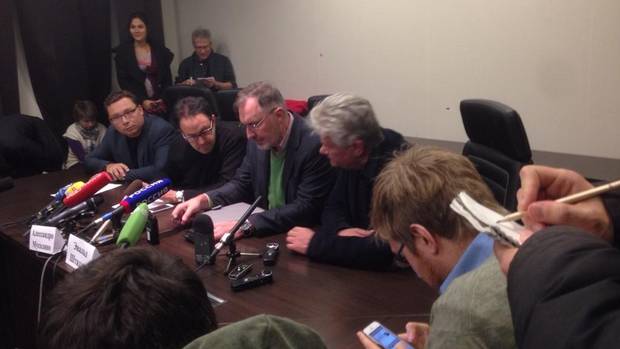There will be a facsimile of an election Sunday in the Donetsk People’s Republic, which is just a faint facsimile of a state. So it’s fitting that a facsimile of an election observer organisation was invented to watch over the process.
The Agency for Security and Cooperation in Europe, or ASCE, was unveiled Saturday evening at a bewildering press conference here in the centre of this war-battered city. The ASCE’s would-be founder – who was evicted last year from Austria’s far-right Freedom Party – changed the new organization’s name back and forth during the press conference, freely switching between calling it the “Agency” and the “Association.” He also slammed Western governments for not respecting Sunday’s vote, and called for European countries to quit the Organization for Security and Cooperation in Europe (the better-known OSCE) and join his new group since the the OSCE had allegedly shown its political bias by refusing to deploy observers to Donetsk and Lugansk for Sunday’s vote.

(Mark MacKinnon/The Globe and Mail)
But the ACSE’s frontman, Ewald Stadler, also admitted he had only been in Donetsk for “five minutes” and fumbled a question about how many monitors the new group would be able to deploy to observe the vote (though he bragged that one of his monitors was an American citizen who was the “grand-nephew of Martin Luther King.”)
The elections Sunday in the Donetsk People’s Republic and adjacent Lugansk People’s Republic were already going to be controversial, even without the advent of the ASCE to watch over them. The votes have been condemned by Ukrainian President Petro Poroshenko and most Western governments as a stage-managed sham, though Moscow has already indicated it will recognize them.
The idea of holding elections here is as astonishing and surreal as almost everything about the Donetsk People’s Republic.
Heavy gunfire and shelling could be heard throughout the day, hours before those who haven’t joined the refugee exodus from Donetsk and Lugansk will be asked to choose directly elected prime ministers and “people’s councils.” There’s little question over who will win, with Aleksandr Zakharchneko, the main separatist leader, and his party – the Donetsk People’s Republic – being by far the most visible candidates. The incumbents are also expected to coast to victory in smaller Lugansk.
Complicating the job of any election observation mission, there’s no list of eligible voters in the territories under the separatists’ control, nor a decent estimate of how many people still live in the region.
But Dennis Pushilin, the first head of state of the DPR – and the man who proclaimed its independence following an equally controversial referendum in April – said in an interview that the elections were necessary to give legitimacy to the agenda of creating an independent state.
“We’re moving to the next step. The revolution period has already passed, and now we’re building a new state and we have a lot to do,” he said in what used to be the local Coal Ministry and is now the office of the “People’s Front of Novorossiya,” an organization dedicated to unifying the areas of Donetsk and Lugansk under separatist control. “Novorossiya,” or “New Russia,” is a Tsarist-era term frequently used by Russian President Vladimir Putin.
Saturday was a tense day in Donetsk, with heavy fighting around Donetsk’s airport, and multiple sightings of an unmarked military convoy approaching the city from the east. But Mr. Pushilin – a 33-year-old with a murky background including times as a Ponzi scheme salesman – said he believes the ceasefire agreed to in September between the Ukrainian government and the separatist leadership can hold and become something more permanent.
If the ceasefire holds, the next step will be to rebuild the war-damaged region and try and make it attractive enough to lure other Russian-speaking areas of Ukraine into joining it.
“Our main goal is to reconstruct [Donetsk and Lugansk], to build the state system to increase salaries and pensions, and improve our industries. We need to make Novorossiya attractive to other residents of the former Ukraine,” he said.
“I think after several years Europe will realize that we are not separatists, that we are integrating into the greater Russian world. Our goal is not to build a border in the west, but to break down the border in the east.”
By Mark MacKinnon, The Globe and Mail.





